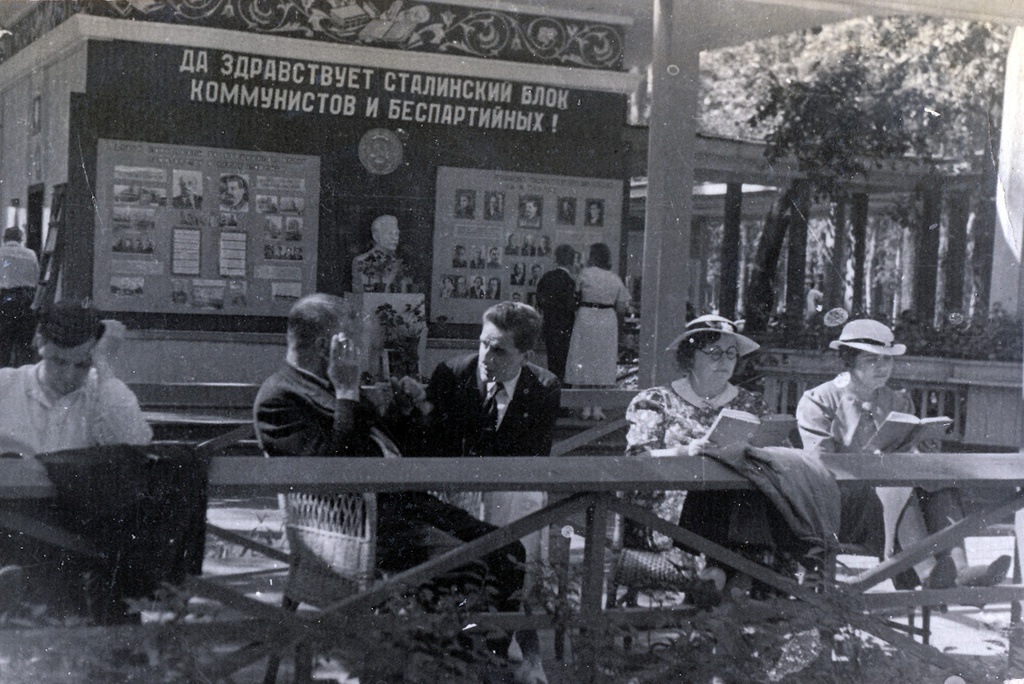День утопий подошел к концу
Это была мечта многих. Но теперь, когда утопии отжили свое, действительность с полной силой заявила что техническая интеллигенция может пойти только одним из двух путей: либо с капиталистами, либо с пролетариатом.
Бриттен доводит свою концепцию до предела. Необъятный, всевидящий мозг — новое божество. Таким образом Бриттон показывает, как жизнь рассеивает иллюзии технической интеллигенции.
Мозг существует 50 миллионов лет. Но люди не становятся счастливее, потому что они обращаются в новое рабство. Они окружены со всех сторон совершенной техникой, они несчастны, потому что они словно щепки, которые несет огромный поток и вертит ими как хочет.
Бриттон хотел изобразить «счастье» людей, не совершивших революцию, но на самом деле он изображает несчастье.
Это мрачное будущее — судьба этих людей, создавших вселенский мозг. Над миром нависла опасность столкновения с огромной темной звездой.
Затем мозг рассказывает, что люди и жизнь на земле длилась миллиарды лет. Что у людей было достаточно времени на то, чтобы объединиться. Человек должен был измениться быстрее. Но люди пожирали друг друга как звери, и понадобились тысячелетия, чтобы возникла идея гуманностищ. Если бы были другие миры, продолжает мозг, все могло бы работать вместе и слиться в единое сознание, но уже слишком поздно.
Мозг лишил человека воли
Этот мозг, лишивший людей их воли, возник как символ эволюции и отрицания революции, и он продолжает говорить, что впереди только ночь. Словами, которые мог бы использовать один из героев Леонида Андреева, он заявляет: «Горе жизни. Горе мысли. Это конец. Это конец всему». Так Бриттон раскрывает тему мышления: «Мозг» направлен против силы мысли, пытается показать ее бессилие. Его тема — гибель мира, у которого нет будущего.
Наши советские художники тоже мечтают. Они тоже хотят увидеть будущее и очертить его далекие контуры. Но они видят другое будущее. Довженко мечтает снять картину о борьбе СССР с приближающимися льдами Гренландии, с новым ледниковый периодом, против которого капитализм бессилен. Разве планета, которую видит Бриттон, не слишком черная, что ослепляет даже его глаза? Мир не погибнет благодаря тому, что есть рабочий класс, благодаря тому что есть СССР — вот о чем должен писать Лайонел Бриттон, который с горячим сочувствием следит за жизнью и работой советского пролетариата.
Day of Utopias Is Gone
This has been the dream of manj. But now, the utopias having had their day, actually shows with its firtl force that this technical intelligentsia can go only one of two Ways, either with the capitalists or with the proletariat.
Though perhaps he is unaware of it, Lionel Britton gives expression to the collapse of the hopes of the technical intelligentsia to play an independent role in human progress.
He carries his conception to the uttermost limit. The vast, all-seeing brain is a new divinity. Through that image Britton shows the illusion of the technical intelligentsia, which life has dispelled.
The brain exists for 50 million years. But people do not become happier, because they fall into a new enslavement. They are surrounded on all sides by exceptional technique, but they are not happy because they are like splinters carried on a mighty stream, which turns them as it chooses.
«Britton wanted to show the «happiness» of people who did not make a revolution—but what he really docs is to show that they are unhappy.
It is a black future which is the lot of these people, creator of the universal brain. A huge dark star threatens to collide with the earth
Then the brain tells the people that life on the earth has lasted billions of years. That was time enough for people to come together. Man might have evolved more rapidly. But human beings devoured one another like beasts and ages passed before the idea of man arose. If there were other worlds, the brain continues, all might have worked together and fused into a single consciousness but now it is too late.
The Brain Robbed Men of Will
This brain, which robbed men of their will, arising as a symbol of evolution and negation of revolution, goes on to say that only night is ahead. In words that one of Leonid Andreyev’s heroes might have used, it declares:
«Woe to life. Woe to thought. This is the end. This is the end of all.»
Such, then, is Britton’s play on the power of thought «Brain» is' directed against the power of thought, attempts to show its impotence. Its theme is the doom of a world which has no future.
Our Soviet artists are also given dreaming. They, too, want to see, and draw its distant contours. But they see a different future. Thus, the producer Dovzhenko dreams of making a picture on the struggle of the USSR with the oncoming ice of Greenland, hiringing a new glacial period against which capitalism is impotent.
Is not the planet Britton sees too dense a black that it blinds even his eyes?
The world shall not perish because here is the working class, because there is the USSR—that; is what Lionel Britton, who follows the life and work of the Soviet proletariat with sncli — warm sympathy, should learn, to see.





